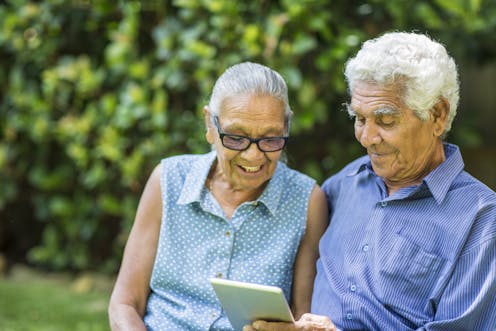A new way to keep First Nations people with dementia connected to Country, community, family and culture
- Written by Colm Cunningham, Conjoint Associate Professor, UNSW

A decline in verbal skills is a source of grief for any person living with dementia.
For First Nations peoples, the loss of speech brings the added pain of lost connection to Country, community, family and culture, which are so central to their health and well-being.
Dementia is a serious emerging health issue for Indigenous people, who experience the disease at a rate between three to five times[1] that of the general population, with onset at an earlier age.
The prevalence of dementia-related risk factors such as diabetes and vascular disease, a lack of education and awareness, and cultural considerations means diagnosis of the condition is often overlooked or delayed[2] by health care services.
Dementia Support Australia, funded by the Australian government, has produced a set of picture cards[3] specifically to support Aboriginal and Torres Strait Islander people as their verbal skills decline and dementia symptoms progress.
Read more: What do Aboriginal Australians want from their aged care system? Community connection is number one[4]
Indigenous Elders suffering from dementia at alarming rates
According to the Australian Institute of Health and Welfare report Dementia in Australia[5], released in September, rates of dementia for Indigenous people in Australia in remote and rural communities are “among the highest in the world”[6].
Elders have a significant role in First Nations communities, and there is strong preference[7] for their care to continue at home or somewhere where they can remain close to their families. There is sensitivity to the idea of removal from their communities. There is a view held by some First Nations people[8] that dementia should not be viewed as a medical issue. Rather, it should be seen as part of the natural cycle of life and death. It’s not a problem as long as it does not adversely affect their cultural connections or responsibilities as elders.
As identified in the recent Royal Commission into Aged Care Quality and Safety[9], there is a pressing need for culturally sensitive support and services for First Nations people living with the condition. One area requiring focus is assistance with communication for people suffering from dementia.
A culturally safe way to communicate
The picture cards, co-designed with First Nations representatives including artist Samantha Campbell, are a simple yet, we hope, effective tool. We recognise that the inability for a person with dementia to communicate what they want or need can be frustrating for both them and care staff.

















